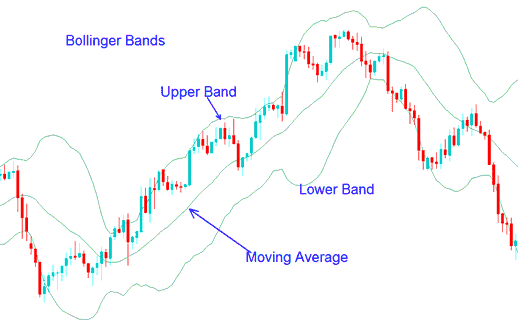Bollinger Bands Strategies Methods
- How Bollinger Bands Works
- Bollinger Bands Market Volatility Analysis
- Bollinger Bands Bulge and Squeeze
- Bollinger Bands Trading Price Action in Trends
- Bollinger Bands Trading Price Action in Range
- Bollinger Bands and Trend Reversals
- Bollinger Bands Strategy Summary
Bollinger Bands Indicator Strategy
Bollinger Bands indicator acts as a measure of volatility. Bollinger Bands indicator is a price overlay indicator.
Bollinger Bands indicator consists of three lines or bands: the middle band (moving average), an upper band a lower band. These 3 bands will enclose the crude price and the crude price action will move within these three bollinger bands.
Bollinger Bands indicator forms upper & lower bands around a moving average. Default moving average for bollinger bands indicator is the 20-SMA. Bollinger Band oil indicator use the concept of standard deviationss to form their upper & lower Bands.
The example of Bollinger Bands indicator is shown below.

Bollinger Band Indicator - How to Trade Oil with Bollinger Band Strategy
Because standard deviation is a measure of crude price volatility and volatility of the market is dynamic, the bollinger bands keep adjusting their width. Higher price volatility means higher standard deviation and the more the bollinger bands widen. Low crude price volatility means the standard deviation is lower and the bollinger bands contract.
Bollinger Bands forex indicator use crude price action to give a large amount of crude price action movement information. The crude price information given by the this bollinger bands indicator includes:
- Periods of low volatility- consolidation phase of the crude trading market.
- Periods of high volatility - extended trends, trending markets.
- Support and resistance levels of the crude price.
- Buy and Sell points of the crude price.



